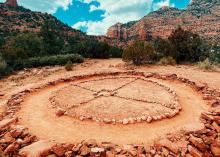Each year, A Common Word Alberta brings Muslims and Christians together in Edmonton to plan an annual interfaith dialogue.
As the facilitator of Mennonite Church Alberta’s Bridge Building network (a re-imagined role that continues the good work of Donna Entz, who retired in 2022), I have played a significant part in planning the last two events.
In the context of the Truth and Reconciliation Commission (TRC) and the recent trauma of identifying the unmarked graves of Indigenous children, the committee explored ways to connect to the Indigenous community.
In October 2023, we collaborated with Father Susai, Father Mark, Cree Elder Fernie and Knowledge Keeper Candida from the Sacred Heart Church of the First Peoples.
We called our dialogue, “Help Me Be Teachable Today.” This is the prayer Elder Fernie, in whose care we were planning our dialogue, prays every day.
The tool used for our learning together was the Cree version of the medicine wheel.
The medicine wheel is a circle with four quadrants that reflects cycles of the natural world and of our human life identities and experiences.
In a report about the 2023 dialogue that I co-authored with Naz Qureshi, a Muslim member of the planning committee, we summarized what we learned as follows:
The medicine wheel can help to heal us and the world.
As Elder Fernie taught, we engage each day with the cycle of life in the medicine wheel.
The four directions help bring awareness to the four aspects of our human life experience that contribute to our wellbeing: our mental health, our physical health, our emotional health and our spiritual health.
Our awareness is the first step to helping us rebalance these when one or more is out of synergy.
For the Sacred Heart Catholic Church of the First Peoples, the cross, in the context of Christ’s great love or “sacred heart,” is at the centre of the medicine wheel.
All of our attention to experiencing the cycles of life, the cycles of planting, growing, harvesting and resting, contributes to our ability to rebalance our mental, physical, emotional and spiritual health. And all of this comes from and goes out from the centre which is our One God—our Creator.
The medicine wheel is a way to balance our inner and outer world. When we reflect on the medicine wheel, we are invited to consider many moving parts of the cycle and the circle—things happening all at once, all the time.
The medicine wheel helps us leave the temptations that pull us out of the centre of the circle.
As we considered together our responsibility to engage with the harm of settler colonialism, we were invited to place the 94 Calls to Action (the policy recommendations of the TRC) in the different quadrants of our wellbeing: our physical, emotional, mental and spiritual wellness.
This exercise then guided our understanding of our connection with supporting the healing needed in the Indigenous community, and our opportunity and responsibility to engage in the changes required of us as a society to correct past harm.
More importantly, this exercise shaped how we think about contribut- ing to the healing required so that harmony might be restored for all of us on this shared land.
As a tool for reflection, the medicine wheel can be used in so many contexts.
I hear our Indigenous siblings inviting us to come alongside them to learn together and be teachable together.
When we do this, we are gifted with different ways of seeing the world, and with that comes new tools and approaches to considering healing from harm—healing for ourselves, healing for our community and healing for all creation.
Suzanne Gross facilitates Mennonite Church Alberta’s Bridge Building network.
Read more From Our Leaders columns:
Responding to God’s call
Seek the blessing of your city
The state of community in 2024




Add new comment
Canadian Mennonite invites comments and encourages constructive discussion about our content. Actual full names (first and last) are required. Comments are moderated and may be edited. They will not appear online until approved and will be posted during business hours. Some comments may be reproduced in print.